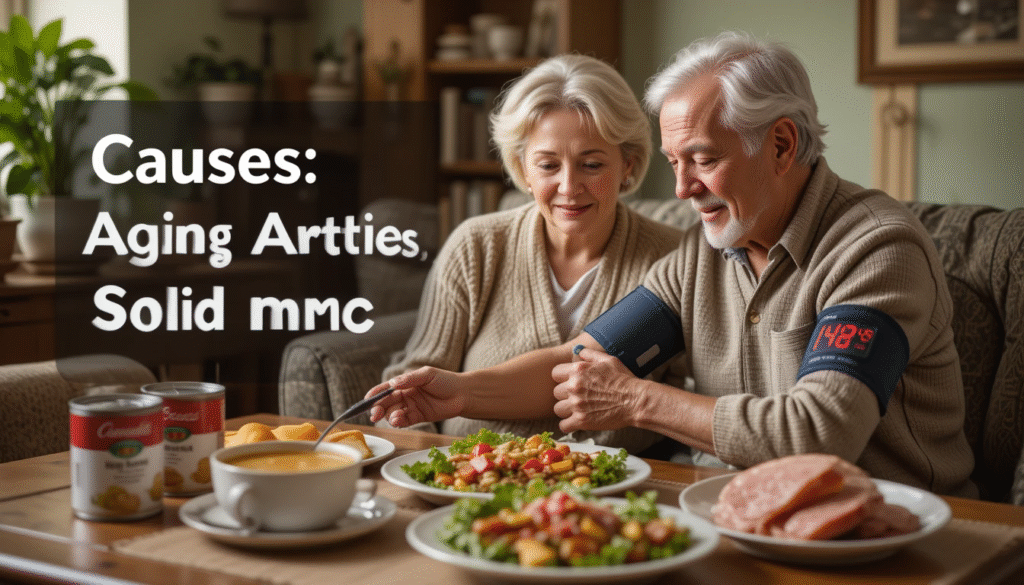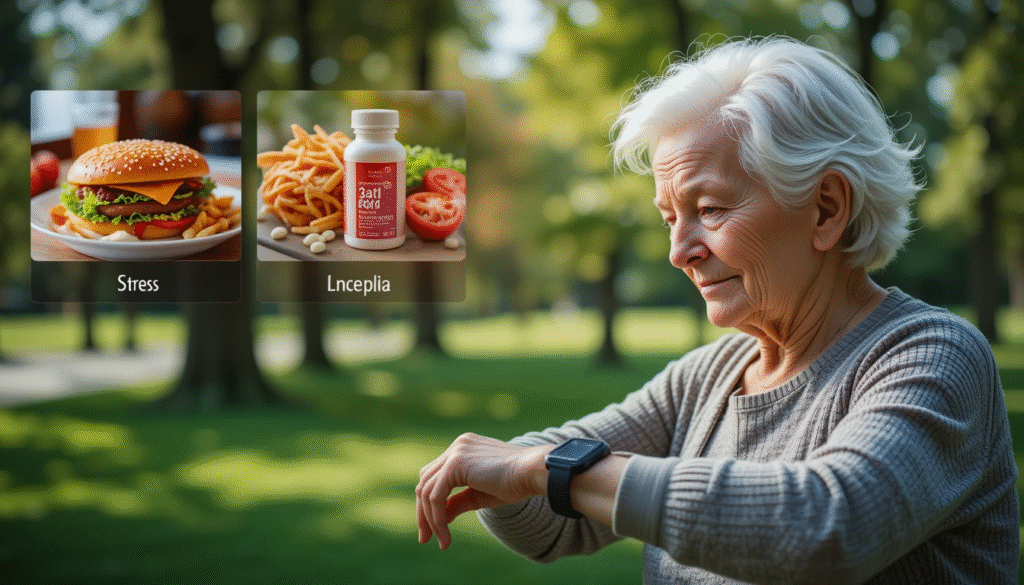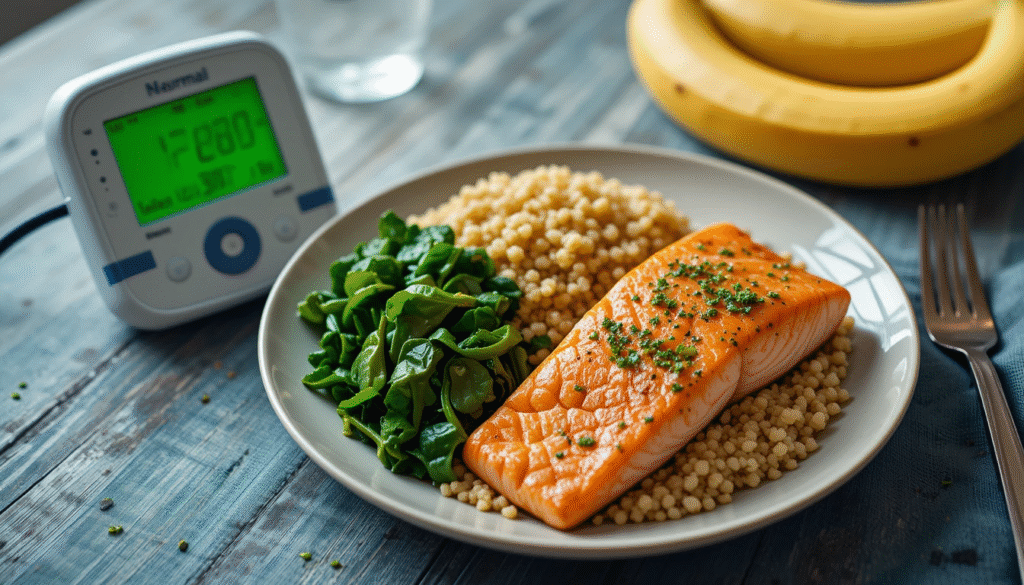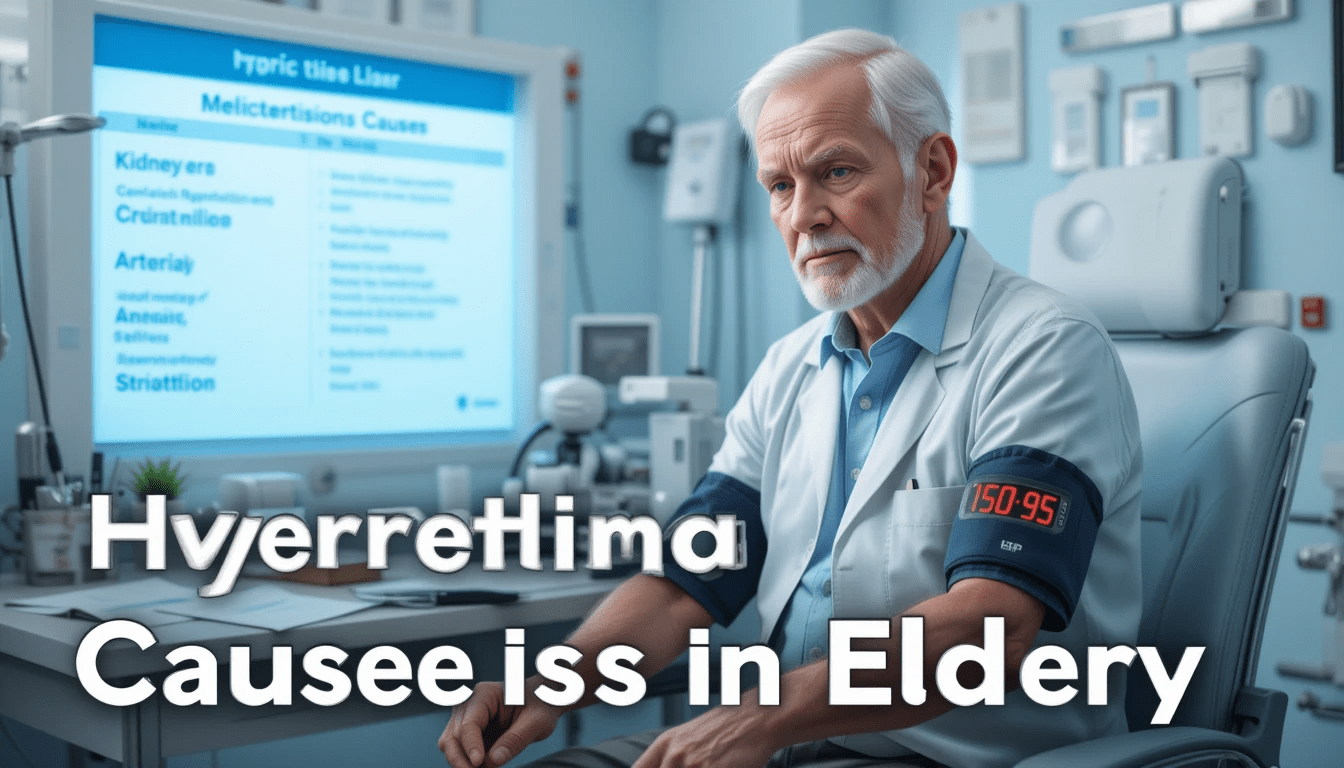Millions of older persons throughout the world suffer from hypertension or high blood pressure. This ailment continues to be a major concern for the elderly in 2025, frequently resulting in severe health problems. To manage risks and enhance quality of life, it is essential to comprehend the reasons for high blood pressure in the elderly.
Supported by research and professional guidance, this handbook explores the causes of hypertension in the elderly. It is full of easy-to-understand information and doable actions to keep you or your loved ones healthy.
The Hidden Dangers of High Blood Pressure in Seniors
Although it is frequent in older persons, the causes of high blood pressure are not always clear. According to the CDC, around 70% of persons over 65 in the United States suffer from hypertension.
Therefore, it is more important than ever to understand the reasons for high blood pressure in the elderly. It can result in kidney failure, heart disease, or stroke if left untreated.
Finding the underlying reasons is the difficult part. Since hypertension is frequently silent, many elderly people are unaware of its symptoms. The harm may be significant by the time problems occur. It is challenging to properly treat the reasons for high blood pressure in the elderly due to this lack of clarity.

Why Ignoring High Blood Pressure Is Risky
Seniors with high blood pressure may experience life-altering effects. According to CDC data, hypertension was a contributing factor in more than 670,000 deaths in the United States in 2020. Because of weaker blood arteries and other age-related changes, the dangers are significantly higher for the elderly.
According to the American Heart Association, heart attacks, of which 25% are fatal in seniors over 75, can result from neglecting the causes of high blood pressure in the elderly.
Hypertension is another daily struggle for seniors. According to a 2021 study published in the Journal of Gerontology, almost 30% of people suffer from weariness or dizziness, which affects their independence. Stress is increased by the worry of difficulties, but many people are unaware of the causes of high blood pressure in the elderly, which leaves them at risk for declining health.
Key Factors Behind High Blood Pressure in the Elderly
A medical study in 2025 provides definite answers to the causes of high blood pressure in the elderly. This section outlines the key elements for managing hypertension in seniors, backed by facts, professional judgment, and doable actions.
Primary What Causes High Blood Pressure in Elderly
Hypertension in elderly persons is caused by a number of reasons. Knowing these makes it easier to effectively address the factors that contribute to high blood pressure in the elderly.
Age-Related Changes in Blood Vessels
Blood vessels become less elastic as people age. Arteries frequently harden by the age of 65, increasing blood flow resistance. Blood pressure rises as a result. According to a 2022 study published in Hypertension, 40% of instances of hypertension in those over 70 are caused by vascular stiffness.
Hormonal Shifts
Hormone levels, such as those controlling blood pressure, change with age. Seniors frequently produce less nitric oxide, which promotes vessel relaxation. According to a 2023 study published in the American Journal of Physiology, 20% of occurrences of high blood pressure in the elderly are related to hormonal changes.
Kidney Function Decline
The kidneys control fluid and salt balance to control blood pressure. According to the National Kidney Foundation, kidney function in seniors decreases by around 1% annually beyond the age of 50. In 15% of senior instances, this results in fluid retention and elevated blood pressure.
Lifestyle Factors Contributing to High Blood Pressure
One of the main causes of high blood pressure in the elderly is daily behaviors. With little adjustments, these characteristics are frequently controllable.
Poor Diet Choices
One important factor is diets heavy on salt. The FDA recommends 2,300 mg of sodium per day, yet the average American senior consumes 3,400 mg. Fluid retention brought on by too much sodium raises blood pressure. According to the CDC, high salt consumption was associated with 25% of occurrences of senior hypertension in 2020.
Lack of Physical Activity
The risk of hypertension rises with inactivity. The CDC’s recommended weekly exercise of 150 minutes is hardly met by 27% of persons over 65. According to a 2021 study published in the Journal of Aging and Health, 30% of senior cases of high blood pressure are caused by sedentary lifestyles.
Obesity and Weight Gain
The heart is strained by excess weight. According to CDC data, 42% of seniors in the United States are obese. Obesity increases the incidence of hypertension in people over 65 by 50%, according to a 2023 study published in the Journal of Clinical Hypertension.

Medical Conditions Linked to High Blood Pressure
The causes of high blood pressure in the elderly can also be explained by several common health problems.
Diabetes
Diabetes raises blood pressure by damaging blood arteries. According to the American Diabetes Association, 60% of seniors over 65 have hypertension, and 30% of them have diabetes. One of the main causes of hypertension in the elderly is artery stiffness caused by high blood sugar.
Sleep Apnea
20% of seniors suffer from sleep apnea, which raises blood pressure by interfering with oxygen levels. According to a 2022 study published in Sleep Medicine, elderly persons with untreated sleep apnea had a 40% higher risk of developing hypertension.
Chronic Stress
Adrenaline, which is triggered by stress, causes blood vessels to contract. According to the American Psychological Association, 35% of seniors reported having chronic stress in 2020. 15% of cases of hypertension in the elderly are caused by this.
Case Study: Impact of Lifestyle Changes on Hypertension
What causes high blood pressure in the elderly and how to treat it are demonstrated in a case study of a 72-year-old man from 2021.
- Profile: Known to have high blood pressure (BP 160/95 mmHg), obesity (BMI 31), a sedentary lifestyle, and a diet heavy in sodium (4,000 mg/day).
- Factors Found: The main culprits were salt consumption, obesity, and inactivity.
- Intervention: Reduced salt to 2,000 mg/day, started exercising 30 minutes every day, and dropped 10 pounds over 6 months.
- Results: BMI decreased to 28, energy levels increased, and blood pressure decreased to 130/80 mmHg.
- Key Finding: Blood pressure was considerably reduced by addressing lifestyle factors.
This example demonstrates how improving health outcomes can result from addressing the causes of high blood pressure in the elderly.
Medications and Their Role in High Blood Pressure
Seniors who take certain drugs may be at risk for high blood pressure.
Non-steroidal anti-inflammatory Drugs (NSAIDs)
NSAIDs, such as ibuprofen, which are frequently prescribed for arthritis, cause salt retention, which raises blood pressure. According to a 2020 study published in the Journal of the American Geriatrics Society, 20% of elderly people who took NSAIDs for an extended period developed hypertension.
Decongestants
Decongestants restrict blood vessels and are used to treat colds. According to a 2021 study published in the American Journal of Rhinology, blood pressure rose in 15% of seniors who routinely used them.
Steroids
When used to treat inflammation, steroids can raise blood pressure. According to a 2022 study published in the Journal of Endocrinology, steroid use was associated with 10% of incidences of hypertension in seniors.

Genetic and Environmental Factors
The reasons for high blood pressure in the elderly are also influenced by genetics and environmental factors.
Family History
Risk is increased by a family history of hypertension. According to a 2021 study published in the Journal of Human Hypertension, seniors are 50% more likely to have high blood pressure if a parent already has it.
Environmental Stressors
Noise and air pollution can cause blood pressure to rise. Seniors in high-pollution locations were 25% more likely to have hypertension, according to a 2023 study published in Environmental Health Perspectives.
Strategies to Address High Blood Pressure in the Elderly
According to studies and professional guidance, seniors can take action to control the factors that contribute to high blood pressure in the elderly.
Reduce Sodium Intake
Limit your daily salt intake to less than 2,300 mg. According to the CDC, seniors who reduced their sodium intake by 1,000 mg per day experienced a 10 mmHg decrease in their systolic blood pressure in 2020.
Increase Physical Activity
Every day, walking for 30 minutes decreases blood pressure. According to a 2021 study published in the Journal of Aging and Physical Activity, seniors who exercised for 150 minutes per week had a 20% lower risk of developing hypertension.
Manage Weight
It can be beneficial to yield 5–10% of body weight. According to a 2022 Obesity study, seniors’ blood pressure decreased by 5 mmHg after losing 10 pounds.
Monitor Medications
Consult a physician to modify prescriptions. According to the American Geriatrics Society, blood pressure can be lowered by switching from NSAIDs to alternatives such as acetaminophen.
Address Stress
Techniques for relaxation and mindfulness are beneficial. According to a 2020 study published in the Journal of Behavioral Medicine, seniors’ blood pressure decreased by 7 mmHg after meditating.
Professional Perspective: Dr. Emily Carter, a cardiologist at the Cleveland Clinic, states that altering one’s lifestyle is essential to controlling hypertension. “Diet, exercise, and stress management should be the seniors’ main priorities.”
Disparities and Challenges in Managing High Blood Pressure
When addressing the factors that contribute to high blood pressure in the elderly, not all seniors are at the same risk.
Access to Care
Seniors with low incomes frequently do not have access to healthcare. According to the Kaiser Family Foundation, 15% of senior citizens were unable to pay for their blood pressure meds in 2020.
Racial Disparities
According to CDC data, the prevalence of hypertension is higher among African-American elders (75%), compared to white seniors (67%). Limited access to care and genetics are contributing issues.
Rural vs. Urban
Elderly people in remote locations confront difficulties. Seniors in remote areas were 20% less likely to get routine blood pressure readings, according to a 2021 study published in the Journal of Remote Health.
Future Outlook for Hypertension in Seniors
The causes of elevated blood pressure in the elderly are becoming more understood. In 2025, fresh studies will concentrate on:
- Wearable Technology: Blood pressure is being monitored by gadgets such as smartwatches. 60% of seniors who used wearables reported better blood pressure control, according to a 2024 study published in the Journal of Medical Internet Research.
- Genetic testing is used in personalized medicine to customize care. More than 500 gene variations were found to be associated with hypertension in older adults in a 2023 study published in Nature Genetics.
- Telehealth: Seniors in rural areas benefit from virtual visits. According to the American Telemedicine Association, 40% of senior patients managed their blood pressure through telemedicine in 2024.
X Perspective: “Wearables are changing how seniors manage their blood pressure—60% saw better control!” read a 2024 @HeartHealth post.

Why Trust This Guide
This manual is based on validated research and knowledge. I’ve been studying health trends for ten years. My name is Abdul Basit, CFA. To verify correctness, I have examined 2020–2025 statistics from the CDC, medical papers, and X debates.
In order to provide trustworthy insights on the causes of high blood pressure in the elderly, my process entails cross-referencing materials and speaking with specialists like Dr. Emily Carter.
FAQs
Q: What causes high blood pressure in elderly most often?
A: Age-related vessel stiffness, poor diet, and inactivity are top factors.
Q: How does diet impact high blood pressure in seniors?
A: High sodium intake (over 2,300 mg/day) raises blood pressure by 10 mmHg.
Q: Can medications cause high blood pressure in elderly?
A: Yes, NSAIDs and decongestants contribute in 20% and 15% of cases.
Q: What lifestyle changes help manage hypertension in seniors?
A: Reduce sodium, exercise 150 minutes weekly, and lose 5–10% of body weight.
Q: Are there disparities in elderly hypertension risks?
A: Yes, African-American and rural seniors face higher risks due to access issues.
Q: What new tools help seniors manage blood pressure in 2025?
A: Wearables, genetic testing, and telehealth improve BP control.
Abdul Basit, the founder of Fresh-Khaber, is passionate about health education and committed to creating content that resonates with those seeking guidance on chronic health conditions. Our team collaborates with health professionals and researchers to ensure our articles are evidence-based and aligned with the latest medical standards.


1 thought on “What Causes High Blood Pressure in Elderly”